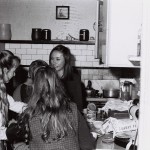On my first year as a married woman there was a full moon at Christmas. Last night it happened again, another full moon that is, not another marriage.
I was twenty five years old when I took that leap into marriage and thirty eight years later after thirty eight Christmases, the full moon rises again and with it the extremes of heat on Christmas day and its opposite the following day with heavy rain and cooler temperatures.
A lifetime of contrasts, which suits me well.
Four daughters later and the youngest just visited to greet me in the morning, just as I embark on the solitude of writing and my life as a writer is again interrupted.
Another contrast.
I have sometimes wondered what it might be like if I had been spared the commitments of marriage and children and somehow managed to live alone. Would I then become the serious writer I dreamed of?
And now the dog visits on the prowl for company but he’s into the half open box of bonbons left over from yesterday’s Christmas lunch. My writing room has once again become the store room at times of stress.
I make it this way. I can’t hold anyone else responsible. When I’m frantic tidying up the mess in readiness for visitors, any excess clutter, which I might otherwise tolerate in the kitchen living area before visitors, I heave into my writing room.
But soon I will de-clutter and change direction.
The other morning I went out early to fetch the newspaper. Eight am and already it was hot with a fierce wind shaking the trees.
‘Where’s the wind coming from?’ my husband asked when I came inside and reported on the weather.
‘I don’t know. Should I know,’ I asked, and he looked at me and laughed.
I’m geographically challenged, I tell people when I need directions. Please don’t talk north, south, east or west to me. I’m lucky enough to be able to distinguish my right from my left.
What basic learning did I miss out on as a child? Or is it commonplace, this locational lack?
I’ve heard tell that the female brain is constructed differently from the male brain as regards navigational skills and orienteering, but to my current way of thinking that sounds constructed.
‘Go out to the front and stand in the garden where there are no trees obstructing your view,’ my husband said, after I asked him how he knows his directions. ‘If the wind’s blowing on your face then the wind is coming from the north.’
We have a north facing front garden. This I have known since we bought this house thirty plus years ago. This was one of its negatives.
Every one here wants a north facing back yard to facilitate a gorgeous garden, where you can raise vegetables and decent plants, but our back yard faces south.
When I am at home I can therefore easily establish where north and south are located and given I know that east is to the side going away from the city then it stands to reason west is in the opposite direction.
I have learned this much and now I know how to establish the nature of wind direction from my home.
But take me away from home and confusion soon sets in again. It’s dizzying and leaves me as tired as our dog on Christmas day.


